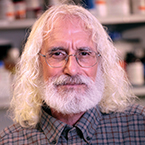
For revealing the immunobiology of host T-cell responses to malignant tumors and pathogenic viral infections, and for providing crucial insights into the biological mechanisms by which T cells distinguish tumor cells from normal cells, leading to the development and advancement of adoptive T-cell therapy approaches in cancer.
An internationally recognized pioneer in the field of cancer immunobiology, Dr. Greenberg has made groundbreaking contributions examining host T cell responses to pathogenic viral infections. His work has led to crucial insights into the understanding of the mechanisms by which T cells distinguish tumor cells from normal cells and has fueled the advancement of adoptive T cell therapy approaches in various cancers malignancies such as leukemia.
Dr. Greenberg helped develop and establish technologies capable of isolating antigen-specific T cells from human peripheral blood and subsequently expanding their population size exponentially. His research demonstrated that these cell populations could then be infused back into patients to specifically recognize and destroy various infections, an observation that has since revolutionized the immunotherapy field and available cancer treatment options. Dr. Greenberg’s team has also helped elucidate the ability of CD4-positive helper T cells to work both collaboratively and independently of CD8-positive cytotoxic T cells to eradicate tumor cells. This work has since been applied to the development of treatments for patients infected with the potentially fatal cytomegalovirus (CMV) pathogen and has shown clinical success in effectively curing late stage melanoma and leukemia.
Dr. Greenberg continues to ardently research methods to genetically engineer antigen-specific T cell receptor (TCR) molecules to combat cancer. More recently, he and colleagues have investigated the use of engineered T cells that specifically recognize the Wilms’ Tumor Antigen-1 (WT-1) protein abundantly found on leukemia cells in an effort to precisely treat patients with acute myeloid leukemia (AML) who have or may be at risk of relapse.
Career Highlights
2019 E. Donnall Thomas Lecture and Prize, American Society of Hematolog
2018 Gold Award for Achievement in Medical Research, Seattle Business Magazine
2017-2020 Board of Directors, AACR
2015 Editor-In-Chief, Cancer Immunology Research, AACR
2011 William B. Coley Award for Distinguished Research in Basic and Tumor Immunology, Cancer Research Institute
2008 Elected Fellow, American College of Physicians
2007 Elected Fellow, American Association for the Advancement of Science
1998 Elected Member, Association of American Physicians
1991-2007 National Institutes of Health MERIT Award
1987 Elected Member, American Society for Clinical Investigation
1978-1981 American Cancer Society Junior Clinical Faculty Fellowship
[Institutional affiliations listed for Fellows reflect those held at the time of their induction into the AACR Academy.]